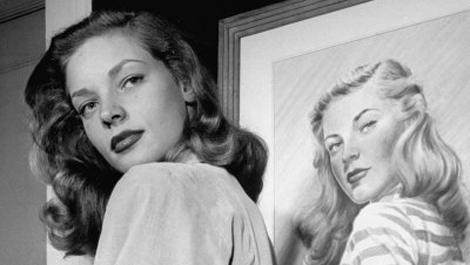Lauren Bacall: In Tribute To An Icon
Saying goodbye to a great from Hollywood's golden age...

Lauren Bacall's final words in the last major piece of journalism about her life were not her own.
As she closed the door to her interviewer, she quoted a phrase Humphrey Bogart and her mother repeated to her. "Character is the most important thing. All that matters is character!"
And what character she had. Tough, funny, smart, brutally honest and even more brutally hard on herself - she hid her Oscar away, ashamed that she'd spent too much of the acceptance speech speaking about Bogart, failing to mention her beloved son Sam, from her second marriage. Where some people have one or two defining qualities, Bacall had ten.
But that Oscar speech is actually pretty typical of discussions of Lauren Bacall. As she discovered on that self-proclaimed worst day of her life, a lot of people find it difficult to talk about her career without name-checking Bogart, the man who - along with Howard Hawks - introduced her to Hollywood, becoming the great love of her life in the process. We mentioned him in the second paragraph, and Bacall herself seemed resigned to the fact he would be as discussed in her obituary as she was.
But let's not do that here. There's too much to say about a woman who received a glowing review from a theatre critic before she even became an actress, a women who idolised Bette Davis to the point of imitation when she was a child, only to find herself signed to the same studio after her debut picture.
But let's start with that review, by George Jean Nathan. “The prettiest theatre usher - the tall slender blonde in the St. James’ Theatre, right aisle, during the Gilbert & Sullivan engagement—by general rapt agreement among the critics, but the bums are too dignified to admit it.”
So, even as an usher she captivated the critical elite, a trend that would continue throughout her career, a career that began early. She was a teenager when Howard Hawks discovered her, a teenager when she started going to Hollywood parties, parties like Cole Porter’s, which she describes so vividly in her biography, By Myself .
Bringing all the latest movie news, features, and reviews to your inbox
“He always had a few soldiers who had no place to go—no home nearby—to dinner and always invited young actresses to dine and dance with them. One day I was having lunch at his poolside and was the last to leave. Finally he walked me to the door. At that moment the door opened. Standing there in white shirt, beige slacks—with a peach complexion, light-brown hair, and the most incredible face ever seen by man—was Greta Garbo. I almost gasped out loud as Cole introduced me to her. No make-up—unmatched beauty. It was the only time I saw her at anything but a distance.”
Perhaps that representation of natural beauty resonated with her, because she resisted any change to her image.
“Howard had chosen me for my thick eyebrows and crooked teeth, and that’s the way they would stay,” she said later.
It seems strange now to know the Hollywood system wanted to adjust her look, a look that was a gateway to talent that carried her through seven decades of cinema, a look that was written about from her first review to her last feature article.
That final major piece of journalism, published by Vanity Fair , was titled ' To Have And To Have Not ,' the name of her first film, and an apparent representation of the piece's main angle - that Bacall had two stages of her life, when she had Bogart and when she did not.
But she always had Bacall. She did some of her best work in her later years, working with Lars Von Trier on Dogville , and Jonathan Glazer on Birth . In 1999, she was voted one of the 25 most significant female movie stars in history by the American Film Institute. Her Oscar came in 2009, in recognition of her contribution to cinema.
That Oscar might not have been on display, but her literary award for her biography certainly was, a centrepiece in a room that also contained rows and rows of photographs of her friends - signed images of Alfred Lunt and Lynn Fontanne, Robert Benchley, Clifton Webb, Noël Coward, Katharine Hepburn, Spencer Tracy, Lionel Barrymore, John Gielgud, and Truman Capote.
In the Vanity Fair piece, she paused beside them, and said: “It’s like all the talent’s gone. It’s very sad."
It is sad. But also a positive reflection of how rich her life was. She said she was happiest around creative people, and what people.
As Bacall said to Vanity Fair : “My son tells me, ‘Do you realise you are the last one? The last person who was an eyewitness to the golden age?’
Those eyes, so wide when she first saw Garbo, are now closed. If character is all that counts when we live, what matters when we pass is how we are remembered.
And Lauren Bacall will be remembered for as long as there are movie theatres. She will be forever associated with beauty, and love. And, for those who knew her, much more.
Sam Ashurst is a London-based film maker, journalist, and podcast host. He's the director of Frankenstein's Creature, A Little More Flesh + A Little More Flesh 2, and co-hosts the Arrow Podcast. His words have appeared on HuffPost, MSN, The Independent, Yahoo, Cosmopolitan, and many more, as well as of course for us here at GamesRadar+.


